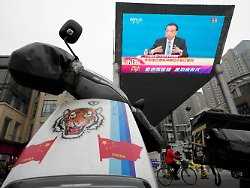People’s Congress comes to an end
China avoids criticism of Putin’s war
03/11/2022, 06:25 am
Beijing has dashed hopes that China would use its influence on Putin to end the Ukraine war. At the end of the People’s Congress, Premier Li was only vague. Concern about the effects of the sanctions on China’s economy is more important to him.
China has called for “extreme restraint” in Russia’s war in Ukraine to prevent a major humanitarian catastrophe. At the end of this year’s session of the People’s Congress, Chinese Prime Minister Li Keqiang again avoided criticizing Russia for the invasion at a press conference. The prime minister also spoke out against international sanctions against Russia. “The sanctions in question are harming the world’s economic recovery,” Li Keqiang said. “No one is interested in it.”
The annual session of China’s parliament ended with a sharp increase in military spending and a lower but ambitious growth target for the second largest economy. As expected, the almost 3,000 delegates in the Great Hall of the People approved the government’s economic course. In the economic uncertainties, also due to the Ukraine war, the prime minister is predicting growth of 5.5 percent this year.
Because of the poor global economy, disrupted supply chains and problems such as real estate circles or over-indebtedness, it is the lowest target in three decades. However, it is considered ambitious and exceeds the expectations of the International Monetary Fund (IMF), which only expects 4.8 percent in China. In 2021, China’s economy had grown by 8.1 percent, but this was also due to the low basis for comparison due to the pandemic in the previous year. By the end of the year, growth had slowed down significantly. The prime minister announced that he would help the economy by reducing taxes and duties.
The People’s Congress session was overshadowed by Russia’s invasion of Ukraine. Hopes that China would use its leverage over its “strategic partner” Russia to secure a ceasefire or a solution have been dashed. Premier Li Keqiang also said only that China “wants to play an active role together with the international community.” He called the situation in Ukraine “really worrying”. “The urgent task now is to prevent tensions from escalating or even getting out of control.”
Expert: “China is not neutral”
Referring to Ukraine, while emphasizing on the one hand that sovereignty and territorial integrity should be respected, the prime minister apparently stressed with reference to Russia that the “legitimate security interests of all countries” must be taken into account. It is now important to support Russia and Ukraine in their negotiations.
Diplomats and experts stressed that China is not really willing to mediate. “No, not for a second,” said China expert Jude Blanchette of the Center of Strategic Studies (CSIS). “China is not neutral. China’s support for Moscow is tacitly bordering on explicit.” Chinese officials also made it clear on the fringes of the conference that China prefers to stay out of the conflict, as has been described.
Against the background of tensions over democratic Taiwan and with the United States, the People’s Congress voted for a sharp increase in defense spending by 7.1 percent. It is the highest increase in three years. Total spending, on the other hand, is only expected to grow by 3.9 percent. China’s determination to “reunify” Taiwan was also reaffirmed at the annual meeting.
Beijing sees free Taiwan only as part of the People’s Republic and is threatening military conquest. The Russian invasion has raised concerns that China in Taiwan may be following Russia’s example in Ukraine. Several senior former US officials visited Taiwan last week to send a signal of US support in the face of the Ukraine crisis.
